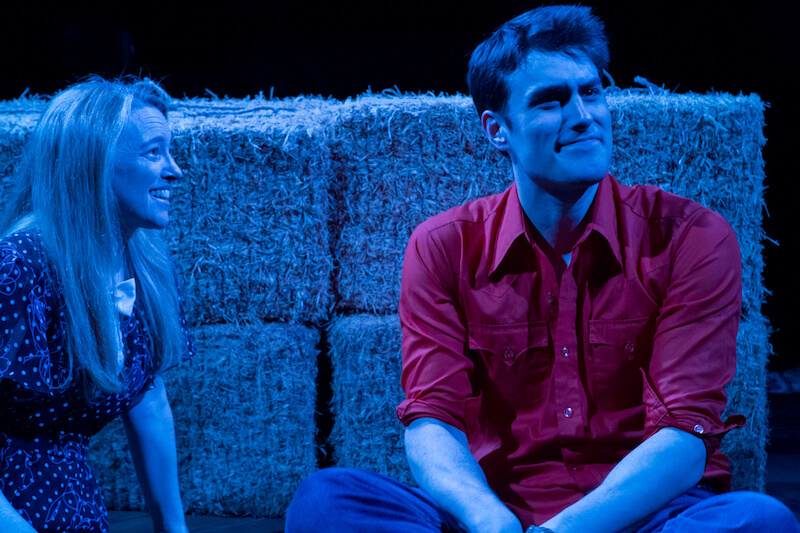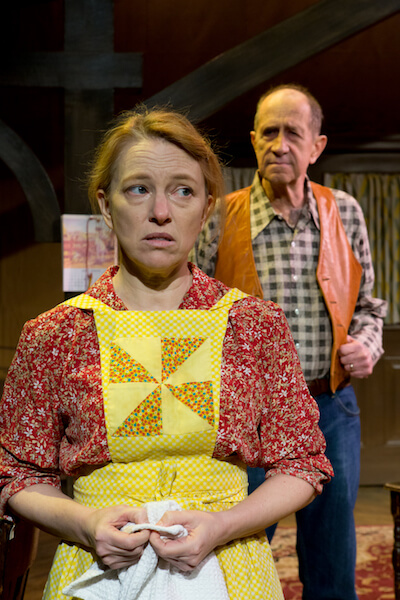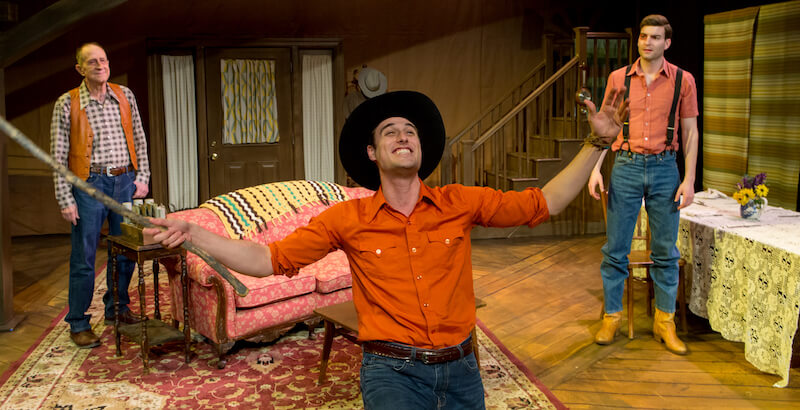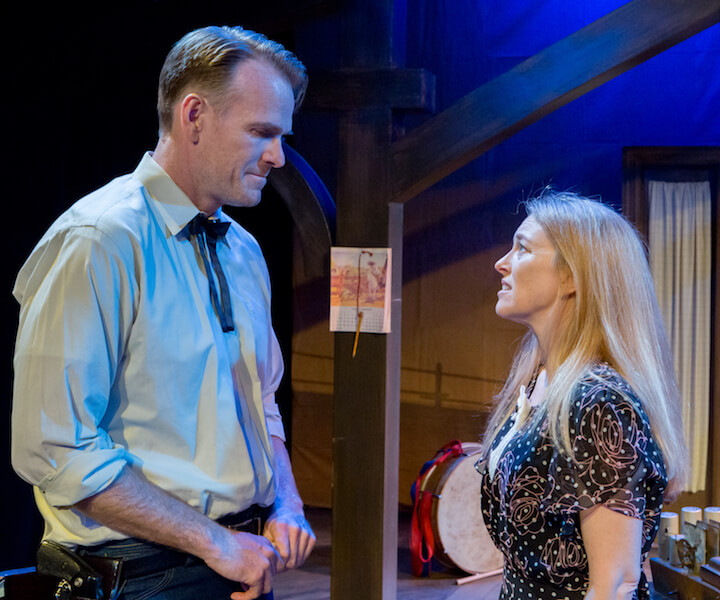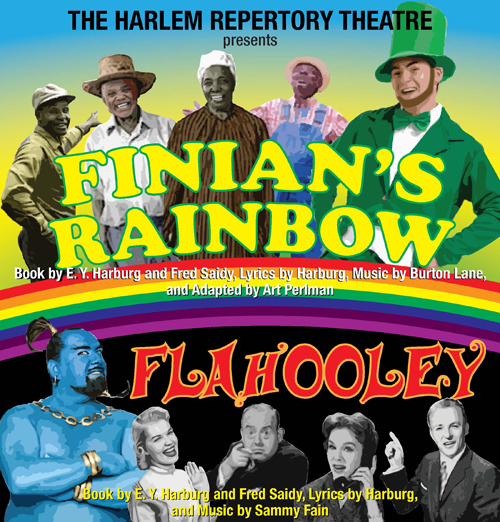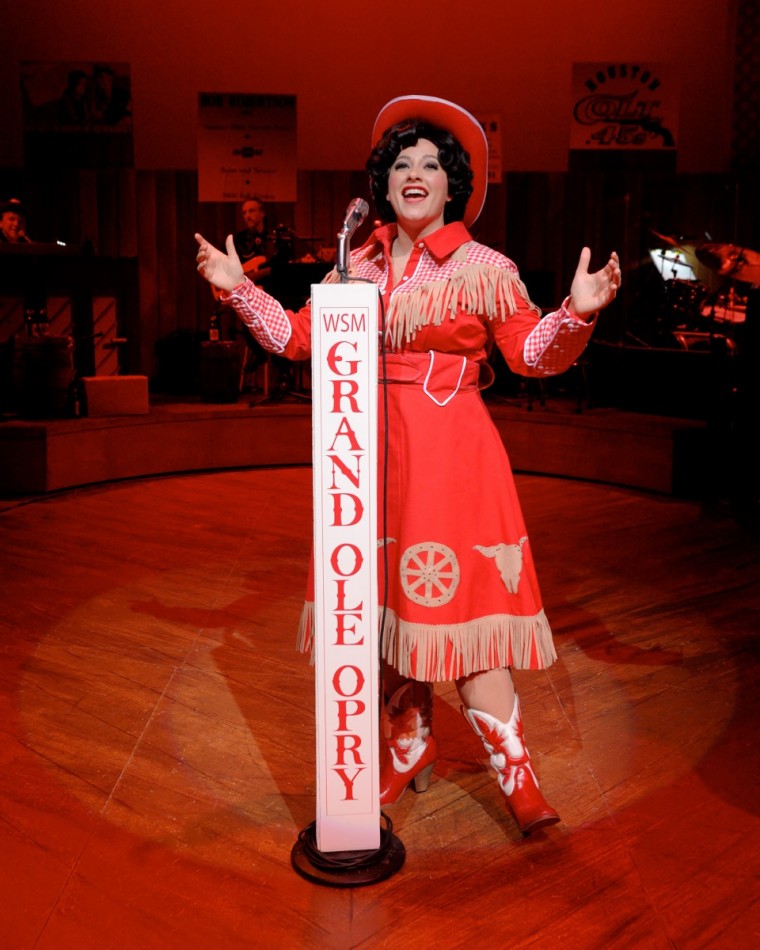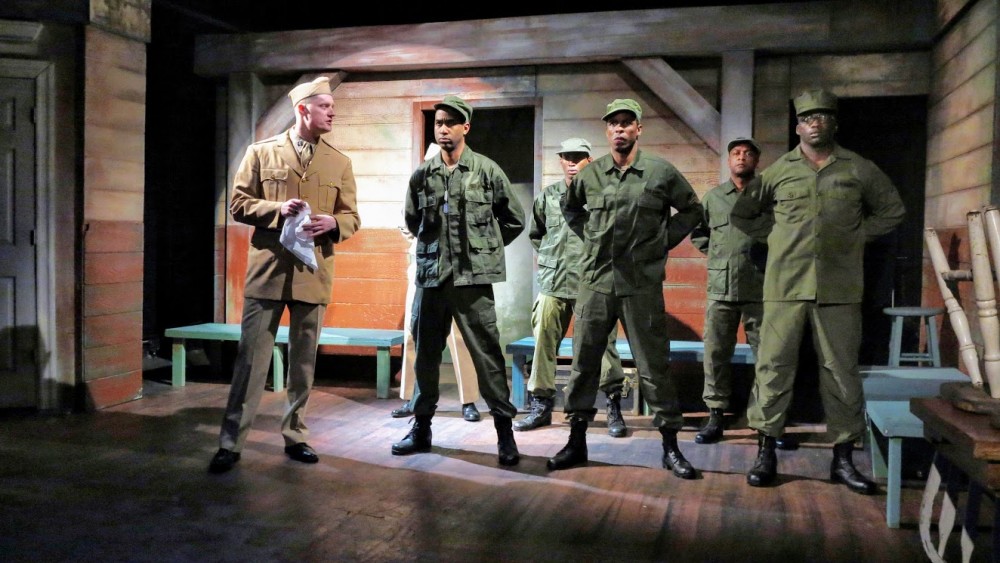By Marilyn Lester
Richard Nash’s 1954 chestnut, The Rainmaker, has been given a worthy revival by the Blackfriars Repertory Theatre and The Storm Theatre. It’s a production that will satisfy, and perhaps delight, those who appreciate classic American theater and those who want to experience the best of the Golden Age of Broadway.
The Rainmaker is an oft-produced piece, a favorite for community theaters and schools, where the play’s universality and direct narrative have great appeal. While billed as a comedy, The Rainmaker’s deeper themes of sibling rivalry, self-confidence, faith, belief, righteousness, pride and redemption keep it from feeling dated and out of romcom territory. In this mounting, the production doesn’t so much play for levity as it does for the more serious side of the piece. In directing the competent cast of The Rainmaker with sobriety, Peter Dobbins misaligns the balance needed for a successful end-game, thereby missing opportunities to elevate the overall tone of the text. The beauty of Nash’s writing is that it’s literate, and even with a predetermined conclusion, the payoff is sublime. The Rainmaker is a play that begs for nuance on the lighter side, to make that payoff all the richer.
The Rainmaker has deep roots in American agrarian culture, especially in the drought-prone West. The action is set in rural Texas, during a devastating drought in the dustbowl prairie in 1928. Rainmakers, a “profession” of the past, made news then. Even the august New York Times reported on the most famous of them. So when H.C. Curry (Ken Trammell), the patriarch of the Curry family, decides to give Rainmaker Bill Starbuck (Matthew Provenza) a chance, he’s not totally off the beam, even though all the arrows point to Starbuck as a con. H.C. is the anchor of TheRainmaker– the adult in the room, the stabilizing force that presides over the action with a knowingness born of experience and inspiration. H.C. also has a sense of fun and mischief, character traits that Trammell develops beautifully. His is a fine and completely believable performance in every way. The actor’s ability to act and react with skill is a joy to behold. Trammell has such an economy of speech and movement that no moment on stage is wasted.
The story centers on the marriageability of Lizzie Curry (Fleur Alys Dobbins). Her spinsterhood is a real concern to her father and her two brothers, Noah (Benjamin Jones) and Jimmy (Sean Cleary) – an issue that loomed large in the social fabric of American life back then. Jimmy is the brash youngest, played stridently by Cleary with bright moments of subtlety and insight peaking through, helping to define the sweeter and more mature side of Jimmy’s character. Jones’ Noah is relentlessly dour; even though his character finds redemption at play’s end, the journey there could use nuance.
Nash uses a stock plot device, the awakening of an insecure female to her true potential as a woman, through the influence of a strong male. In this case, the repressed Lizzie, like a bud opening to flower, is released by the flattering attentions of Starbuck, himself, as it turns out, an individual in search of himself. Provenza’s Starbuck occasionally hits subtle notes, but it’s a role that requires nuanced levels of interpretation of a complex character, not bravado. Provenza has the look – he’s the tall, dark and handsome type – but lacks the smooth-talking magnetism that’s Starbuck’s facade. The strength of Nash’s writing makes both Lizzie and Starbuck likeable in their vulnerability. You want to root for both of them. Dobbins’ best moments came in the hayloft scene when the actress allowed herself to yield to the Rainmaker. In the main, though, her Lizzie tended toward whininess, making it hard to empathize with her plight.
It’s in that long-awaited scene in the hayloft, more a sweet (therapeutic) exchange than libidinous interlude, that the best and most vulnerable qualities of Lizzie and Starbuck are revealed. It’s a powerful climax setting up a brilliant denouement where the double entendre meaning of Rainmaker comes to light. All is resolved, including a subplot involving the Deputy Sheriff, File, played by Jim E. Chandler with authenticity. File is Lizzie’s mirror, a man struggling with pain and loneliness who’s able to rise above his deficits in the end, just as Lizzie does. After all, with the exception of H.C. (and the Sheriff, a minor character, nicely played by Jim Haines) all the souls in The Rainmaker are pretty much lost. Nash’s happy ending of magic and miracles is the sheer delight that makes the play a favorite.
In working with a black box, single set, Scenic Designer, Sheryl Liu made the farmstead interior work with scenes set in the Sheriff’s office and bar. Period costumes were designed by Danica Martino, with sound design by Caroline Eng and lighting design by Michael Abrams. Stage Manager is Kateryna Turkalo. Producer is Peter John Cameron, O.P.
The Rainmaker, Blackfriars Repertory Theatre and The Storm Theatre Present, through Sunday, May 20, 2018
The Sheen Center, Black Box Theater, 18 Bleecker St., New York, NY, 212-219-3132, www.sheencenter.org


